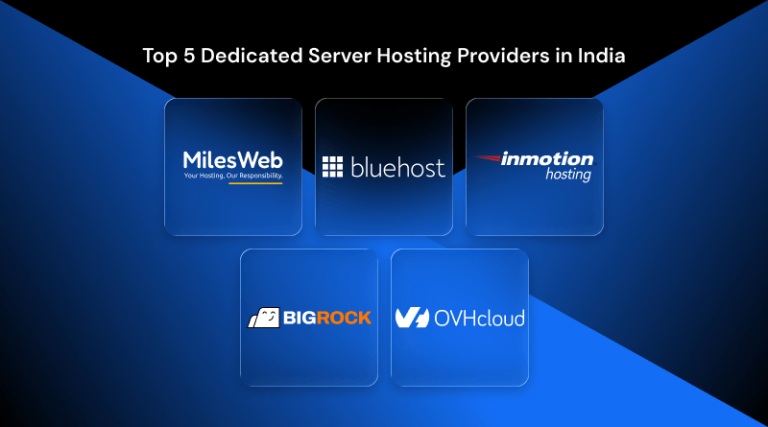Did you know that more than 4.4 million eCommerce websites around the world were powered by Shopify in 2024? Strengthening its position as one of the most commonly adopted online shop builders globally.
But hold on for a second…here is where things get more interesting!! Just because it is being used by a lot of people does not prove it is the best. A lot of online store owners find the best alternatives to Shopify; in their opinion, it is more expensive, less scalable, and less easy to use.
Additionally, small business owners, online product sellers, and dropshippers are continuously on the lookout for Shopify competitors or platforms like Shopify.
With an online eCommerce website, it is also important to select the right web hosting provider, like MilesWeb, that offers powerful hosting solutions to support websites similar to Shopify. Their affordable hosting plans guarantee faster load times, stable uptime, powerful security, and round-the-clock support, perfectly suitable for startups and established online enterprises.
Whatever your needs are, this blog will help you find the best e-commerce platforms like Shopify. Pair it with the top hosting solution for long-term success.
Table Of Content
What is Shopify?
Shopify is a compelling eCommerce platform where you can establish your online business. Online retailers and merchants find it a convenient platform because Shopify has some amazing features. These features include a POS (Point Of Sale) app for payment across different geographical locations. Suppose you are also a merchant looking to showcase a brand with a multi-channel experience to engage consumers. Subscribe to Shopify, and generate revenue.
Why Choose Shopify?
Shopify provides a perfect balance of simplicity and scalability that enables business owners to stay ahead of the competition. No matter if you possess a simple online store with a small budget or need to deal with large enterprises with millions of dollars, the ecommerce platform has everything to suit your needs. It grows with your business and improves your online visibility using Yoast SEO for Shopify, which results in more traffic and business.
Shopify is a boon to building a scalable online platform for beginners with less technical proficiency. Get a range of sleek templates and flexibility that make website development and e-trading a cakewalk for non-tech users.
However, that does not mean you should stop looking for an alternative to Shopify. I have brought information on why keeping alternatives should be on your to-do list.
Why Look For Sites Like Shopify?
1. Full control over SEO
Search Engine Optimization is a crucial digital marketing factor that determines the search engine rank. After all, it has an impact on the organic search of your e-store. However, managing SEO activities in Shopify is challenging because it does not allow users to access and edit robot.txt files. Google acknowledges these files to index your site and show it on Search Engine Result Pages.
2. Unwilling to Continue Shopify Payments
Shopify has its own payment gateway ‘Shopify Payment’ powered by Stripe. If you use this payment gateway, the transaction fee is levied upto 2% of each sale. This makes transactions in multiple currencies impossible, followed by many crucial payment activities. Either way, e-store owners have to use the Shopify Payment gateway to allow payment features for customers.
3. Problems with customization
Manual efforts of website developers are more in demand when it comes to building an e-store in Shopify. Different customization features like developing storefront and checkout pages are a few activities where web developers may struggle. So, imagine how difficult it could be for new users to build a site with Shopify? Hence, they search for an alternative to Shopify.
Related: A Beginner’s Guide to Content Management Systems
Shopify Alternatives You Are Looking for!
1. Squarespace
Squarespace is one the best Shopify alternatives suitable for individual bloggers, artists and small businesses. Thankfully, it has an easy-to-use interface and features that make it a perfect eCommerce solution. Install this tool and sell unlimited products online within a few clicks. Hmm.. how much does it costs? In 2026, their Basic Commerce plan begins at $40 per month with a monthly billing cycle or $28 per month with an annual billing cycle.
Are you having a creative mindset and want to make relevant changes? Squarespace gives you the space for your creative freedom. Integrate social media tools and templates of any industry niche and start your e-store within minutes.
Key Features:
- Extensive Templates: This Shopify alternative has more than 150 modern ecommerce templates for users. This cheap Shopify alternative is perfectly suitable for different types of websites, such as portfolios, blogs, and beautifully designed storefronts.
- Content Creation and Blogging Tools: Squarespace offers excellent tools for blogging and has a drag-and-drop feature. This Shopify alternative is perfect for content-based businesses.
- Search Engine Optimization Tools: Squarespace is the free alternative to Shopify, which is equipped with in-built SEO tools that help you to rank your website higher on the search engine result pages.
- Seamlessly Integrating Content and Commerce: Squarespace serves as a robust feature to seamlessly add the fundamentals of design and e-commerce for small to medium-sized e-commerce businesses.
2. Wix
Wix is a buzzing term in the web development arena. I hope most of you have heard about it! You can set up an online store within a few minutes and pass on the technical burden like back-end management or data security on Wix’s hosting services. Somewhere down the line, I find it similar to WordPress because it has a drag-and-drop builder tool, too!
$35 is the monthly cost of the eCommerce Business VIP plan of Wix, and it includes powerful features such as priority customer support, storage space, unmetered bandwidth, and much more.
Key Features:
- App Support: Wix is another well-known Shopify alternative that provides a wide range of applications to meet the needs of blogs and portfolios.
- eCommerce Capabilities: Wix is one of the best Shopify alternatives, which is perfectly suitable for small to medium-sized businesses, combining commerce as well as content operations.
- Website Customization: Using Wix, you can develop any type of website.
3. Magento
Magento and WooCommerce are open-source e-commerce platforms; therefore, they can be downloaded for free and used. But, having said that, there is a significant difference in their total cost of ownership. Thus, I find it an ideal Shopify alternative for shop owners because you cannot ignore the well-established community worldwide.
This content management software is free; however, you have to pay a service charge for hosting, themes and plugins. If you are looking to sell your products in an open-source ecosystem, Magento is the perfect Shopify open source alternative. Do you want to know additional benefits? It offers responsive designs for eCommerce stores with cutting-edge technologies.
Key Features:
- Personalization Options: Magento is an open-source CMS that offers a completely customizable e-commerce platform that is perfect for businesses that are looking for distinct designs and features.
- Flexibility: Magento is considered the best Shopify competitor because it supports huge enterprises with large product collections.
- SEO Optimization: SEO functionalities offered by the Magento ecommerce platform include leading-edge SEO control, i.e., easily adjustable URLs, metadata, and canonical tags.
- Support for Multiple Stores: Magento’s built-in multi-store support functionality simplifies the task of managing multiple storefronts.
4. Prestashop
When you are on a tight budget and want to build a compelling eCommerce store, Prestashop will make this task easier for you! It comes at zero cost but be ready to pay for add-ons like hosting packages and the domain name. Prestashop is collaborated with Azure, WebHostingHub and IONOS to meet shop owners’ technical requirements.
This alternative for Shopify supports in more than 25 languages with no additional transaction fees and accepts international payments. Beginners can develop a top-notch eCommerce website if they have a bit of web development expertise.
Key Features:
- Pricing Structure: Prestashop is another website like Shopify that is free to use due to its open-source platform. Users are required to pay for hosting, domain, and optional features.
- Customization Options: This cheap Shopify alternative is equipped with plenty of customization options, including more than 5,000 modules and themes.
- Expandability: Scalability mainly depends on the type of hosting you select. However, it is suitable for all sizes and types of businesses.
5. WooCommerce
WooCommerce I find the best Shopify alternative that powers more than 7.4% of all websites. WordPress users find it the best alternative to Shopify because WooCommerce has a range of plugins, themes and other compelling features. It is compatible with online store builders like WordPress, BigCommerce and Shopify.
As a website owner, WooCommerce makes customization easier with tons of premium designs and themes. Additionally, you can enhance the WooCommerce store’s experience with the help of CSS, HTML and plugins. Moreover, tracking an abandoned cart is possible with WooCommerce.
Key Features:
- Pricing: It is a free WordPress plugin. But users have to pay for hosting, themes, and extensions, which makes it an affordable Shopify alternative.
- Custom Setup: It allows you to customize design layouts using code without any complexities.
- Complete Control: Users are given complete control over their data and storage hosted on their selected servers.
Shopify is a good option, but there are others. Ranging from WooCommerce, which is an open-source, user-focused, and cutting-edge Shopify alternative, to elegant online shop-building platforms like Squarespace and Wix, every other option has something to offer. Your ideal online store platform must consider your individual goals—total design control, improved pricing, or better scalability. It is important to analyze the features offered and try free trials and select a web host that empowers your growth.
FAQs
Which are the best Shopify alternatives for large or enterprise-level businesses?
Squarespace, Wix, Magento, Prestashop, and WooCommerce are all considered excellent alternatives to Shopify for a large or enterprise audience.
How hard is it to transfer the current online store from Shopify to other websites like Shopify?
It could be slightly challenging to transfer your current website from Shopify to websites similar to Shopify. It means transferring the products, customer base, content, and URLs, which need to have technical expertise or third-party tools. A few platforms have built-in migration plugins or services to simplify the process.
What services help you to easily migrate away from Shopify?
Sometimes, it’s a really big task to migrate away from Shopify, but with special tools like LitExtension, Cart2Cart, etc., one may automate the transfer of products, customers, and orders.
Which common challenges can I face when migrating from Shopify to other websites like Shopify?
When switching to e-commerce platforms like Shopify, common challenges include data loss, formatting issues, changes in URL structure that can affect SEO, design issues, incompatibility with existing plugins, and downtime.




















